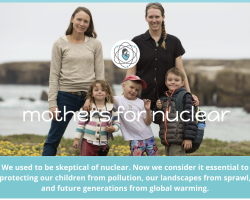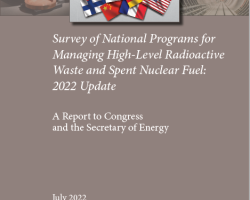Category of Content
Siting Experience Documents Only
Publication Date
Subject Matter
Generic Repository Design Concepts and Thermal Analysis (FY11)
Generic Repository Design Concepts and Thermal Analysis (FY11)
Geotechnical and performance assessment impacts of DPC
Geotechnical and performance assessment impacts of DPC
Geomechanical and performance assessment impacts of DPC disposal in various host rock environments
Geomechanical and performance assessment impacts of DPC disposal in various host rock environments
Investigations on Repository Near-Field Thermal Modeling
Investigations on Repository Near-Field Thermal Modeling
Coupling the Mixed Potential and Radiolysis Models for Used Fuel Degradation???
Coupling the Mixed Potential and Radiolysis Models for Used Fuel Degradation???
Ground Motion Inputs for the Seismic Shake Table Test
Ground Motion Inputs for the Seismic Shake Table Test
Shaker Table Test Plan
Shaker Table Test Plan
Initial Performance Assessment to Evaluate Technical Feasibility of Direct Disposal of Electrorefiner Salt Waste in Salt Repository
Initial Performance Assessment to Evaluate Technical Feasibility of Direct Disposal of Electrorefiner Salt Waste in Salt Repository
Mothers for Nuclear Flyer
Mothers for Nuclear Flyer
Mothers for Nuclear Informational Flyer
Guidance for Creating a Community Benefits Plan for Regional Direct Air Capture Hubs
Guidance for Creating a Community Benefits Plan for Regional Direct Air Capture Hubs
This document is intended to provide supplemental information to assist applicants developing a Community Benefits Plan (CBP) for the Regional Direct Air Capture Hubs. As shown in the graphic to the right, Community Benefits Plans are based on a set of four core interdependent policy priorities: engaging communities and labor; investing in America's workforce; advancing diversity, equity, inclusion, and accessibility; and implementing Justice40.
The Social and Ethical Aspects of Nuclear Waste
The Social and Ethical Aspects of Nuclear Waste
Nuclear waste management seems to exist in a perpetual state of crises. For 50 years the nuclear states of the world have fought, and generally lost, the battle to deal with the nuclear waste problem. Worldwide, there is a growing acknowledgement within industry and government that social and ethical issues are just as important as technical issues when developing safe programs for nuclear waste management. This paper is a review of some of the outstanding social and ethical issues that are influencing discussions on nuclear waste management around the world.
Policies for Achieving Energy Justice in Society: Best Practices for Applying Solar Energy Technologies to Low-Income Housing
Policies for Achieving Energy Justice in Society: Best Practices for Applying Solar Energy Technologies to Low-Income Housing
Studies indicate that the energy burden — energy costs as a percentage of annual family income — on low-income families is inordinately high, compared to that of the rest of the population. Rising fuel costs exacerbate this problem. Residential solar energy systems can help address this situation by furnishing a price-stable energy source with the added benefit of reduced greenhouse gas emissions. However, without appropriate incentives, these systems are prohibitively expensive for low-income families.
Survey of National Programs for Managing High-Level Radioactive Waste and Spent Nuclear Fuel: 2022 Update
Survey of National Programs for Managing High-Level Radioactive Waste and Spent Nuclear Fuel: 2022 Update
In October 2009, the U.S. Nuclear Waste Technical Review Board (Board or NWTRB) published Survey of National Programs for Managing High-Level Radioactive Waste and Spent Nuclear Fuel. For each of the 13 national programs studied, the report catalogued 15 institutional arrangements that had been set in place and 15 technical approaches that had been taken to design repository systems for the long-term management of high-activity radioactive waste.


